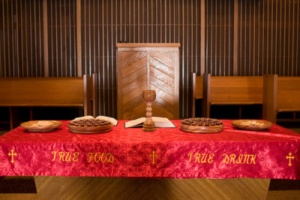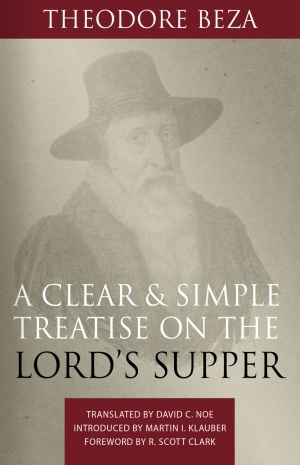On June 9, 1886, a funeral was held in a church in Lancaster, Pennsylvania. The deceased, John Williamson Nevin (1803–86), was a pastor, professor, and theologian in the German Reformed Church. Friends and family were in attendance as well as several theologians and professors of differing fame and reputation. None of this was unusual for a theologian’s funeral in nineteenth-century America. There was, however, at least one irregularity: A. A. Hodge (1823–16) gave one of the eulogies.1 Hodge’s late father, Charles Hodge (1797–1878), and Nevin were involved in one of the most prominent sacramental controversies in nineteenth-century America, yet the younger Hodge eulogized the very man who contested with his father decades before. Even now, the controversy and the theologies that gave rise to it live on long after the death of the major figures. Continue reading →
Lord’s Supper
If We Baptize Infants Why Do We Not Also Commune Them?
The Lord’s Supper Is Not Penance
In our course on the Reformed Confessions the end of the semester brings us near the end of the Belgic Confession, to article 35 on the Lord’s Supper. It is a marvelous confession of what God’s Word teaches us about the nature . . . Continue reading →
Eating Christ: What, Why, And How (John 6:53–56)
So Jesus said to them, “Truly, truly, I say to you, unless you eat the flesh of the Son of Man and drink his blood, you have no life in you. Whoever feeds on my flesh and drinks my blood has eternal life, and I will raise him up on the last day. For my flesh is true food, and my blood is true drink. Whoever feeds on my flesh and drinks my blood abides in me, and I in him (John 6:53–56; ESV). Continue reading →
Now On Sale For $10.00: Beza On The Lord’s Supper
Owen Gives Us Theological Reasons To Object To Intinction
2. The special object of faith, as justifying, is not the special object of faith in this ordinance. The special object of faith, as justifying, is the promise, and Christ in the promise, in general, as “the Saviour of sinners:” so when . . . Continue reading →
Herman Witsius Contra Intinction
XXV. Next follow the actions of the disciples, and consequently of the other guests. And these, according to Christ’s appointment, are three: first, to receive both the bread and the cup; but each separately, for so Christ distributed them: in this manner . . . Continue reading →
Ignatius Of Antioch As A Remedy For Two Weaknesses In Contemporary Evangelicalism: The Reality Of Christ’s Humanity And The Reality Of The Church
Each autumn term one of my responsibilities is to spend about half the semester helping a group of students to walk through the Apostolic Fathers, a collection of second-century Christian texts which was first compiled in the 17th century. That collection has . . . Continue reading →
Virtual Communion Is Not Communion
There are several reasons why the meal that was in Jesus’ presence which he constituted as the Lord’s Supper cannot be shared across the internet’s bandwidth. First, this Supper is a churchly meal. The Supper that we receive has to be “this . . . Continue reading →
PCA General Assembly Rulings On Virtual Communion
For those who’ve inquired about any PCA precedent on digitally “administering” the Lord’s Supper, below is a pertinent string of excerpts from the Minutes of the 39th, 40th and 41st General Assemblies (2011, 2012 and 2013 in Louisville, Virginia Beach and Greenville SC). Continue reading →
With Presbycast On Virtual Communion—UPDATED
Regular readers of this space will know that I am a regular (or perhaps, more properly, an irregular) guest of the Presbycast podcast hosted by Brad Isbell (Chortles Weakly) and Wresbyterian. This is a valuable (if sometimes quirky) resource for the confessional . . . Continue reading →
Should You Give Yourself Communion At Home?
Joe writes to ask Hi Dr. Clark, My church is currently streaming service online and advocating for family worship at home. They are also encouraging us to get bread and juice/wine and take communion during service hours with our families. Is this . . . Continue reading →
There Is Another Way: A Response To Francis Chan
“Again, I’m not making like any grand statements. I’m just saying that some of this stuff I didn’t know. I didn’t know that for the first 1500 years of church history, everyone saw it as the literal body and blood of Christ. . . . Continue reading →
How Old Must A Child Be To Come To The Lord’s Table?
How old must a child be to come to the Lord’s Table? We know from the nature of the two sacraments (covenant signs and seals) instituted by our Lord that infant communion (paedocommunion) is an error. It confuses the sign of renewal . . . Continue reading →
Between Magic And Mere Memory
When Christians receive the Lord’s Supper or when people are baptized, what happens? Is it the case that, as Rome claims, at consecration, the elements of bread and wine are transformed (transubstantiated) so that they are no longer, in substance, bread and . . . Continue reading →
Prima Facie Evidence Against Intinction
Intinction is the practice of administering the Lord’s Supper (Holy Communion) by dipping the bread into the wine rather than by giving the cup directly to the laity. It is not in itself a denial of the cup but arguably it is . . . Continue reading →
Intinction Has Led To Removal Of The Cup From The Laity
Respect the sacramental table to which you have approached, the bread of which you have partaken, the cup in which you have communicated, being consecrated by the sufferings of Christ.5 5. Note that this allusion implies that Communion in both Kinds was . . . Continue reading →
Synod of Herbon (1586): Weekly Communion Most Corresponds To Christ’s Ordinance
45. The Lord’s Supper shall be celebrated at least every month, and everyone at their location should strive that if the whole congregation cannot participate every Sunday (which most corresponds to Christ’s ordinance and to apostolic custom and is greatly desired), at . . . Continue reading →
Luther Against Denying Communion In Two Kinds
I conclude, then, that it is wicked and despotic to deny both kinds to the laity, and that this is not within the power of any angel, much less of any pope or council. Nor does the Council of Constance give me . . . Continue reading →
Turretin Answers Objections Against Infant Baptism (2)
VI. To no purpose is the reply: (1) “Hence it would follow that the Lord’s Supper should also be administered to infants because the thing signified belongs to them.” Although the same thing is signified in both, still there is a difference . . . Continue reading →










